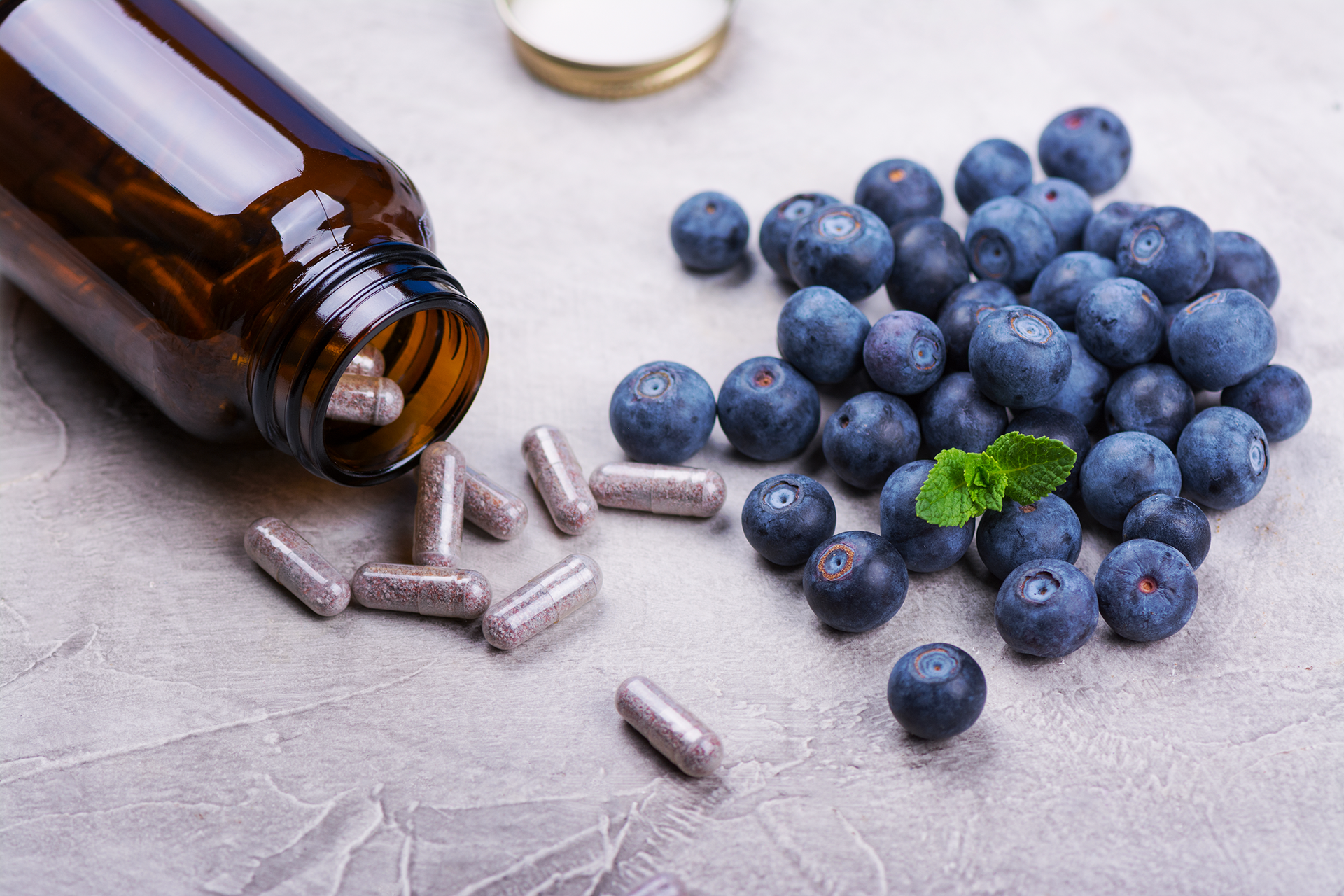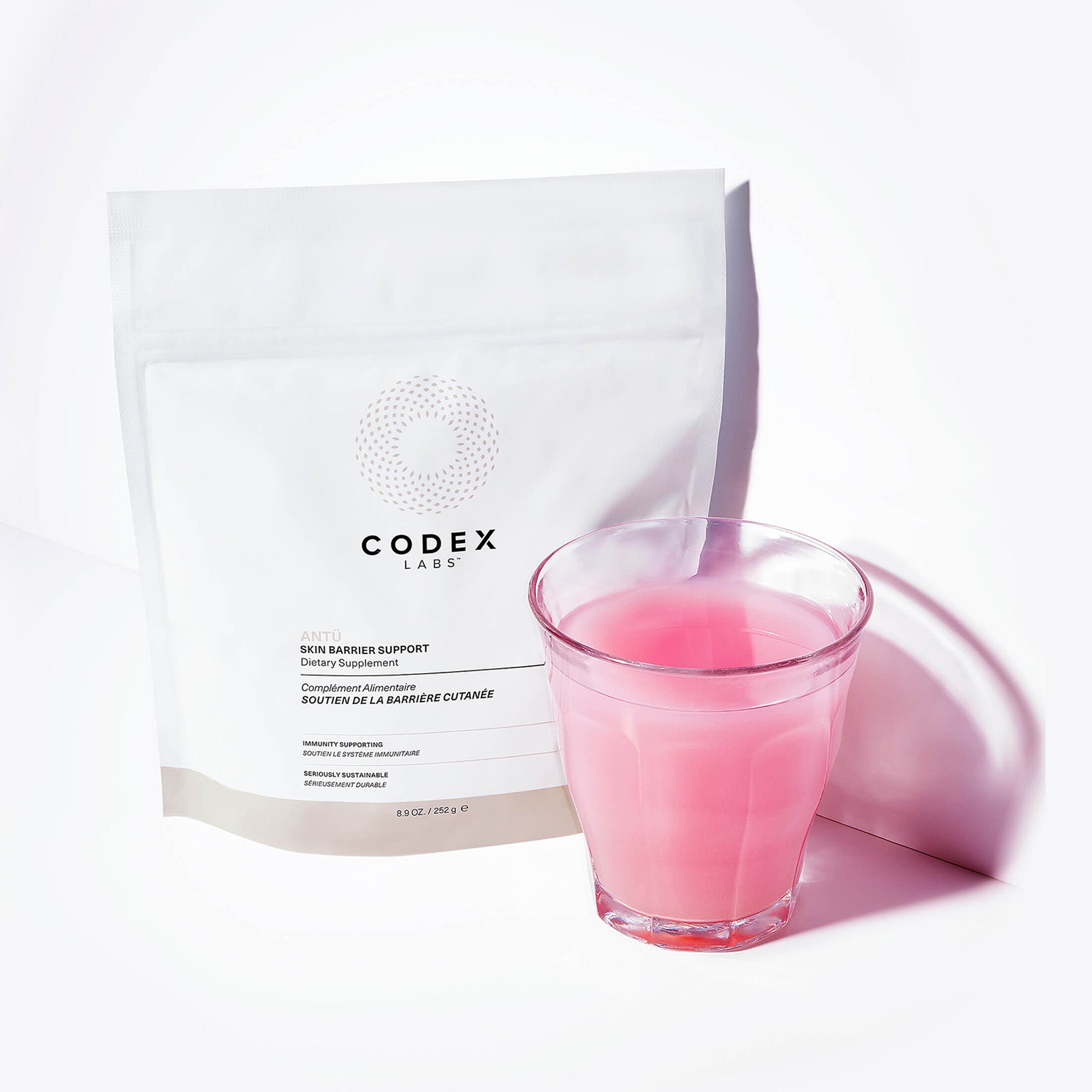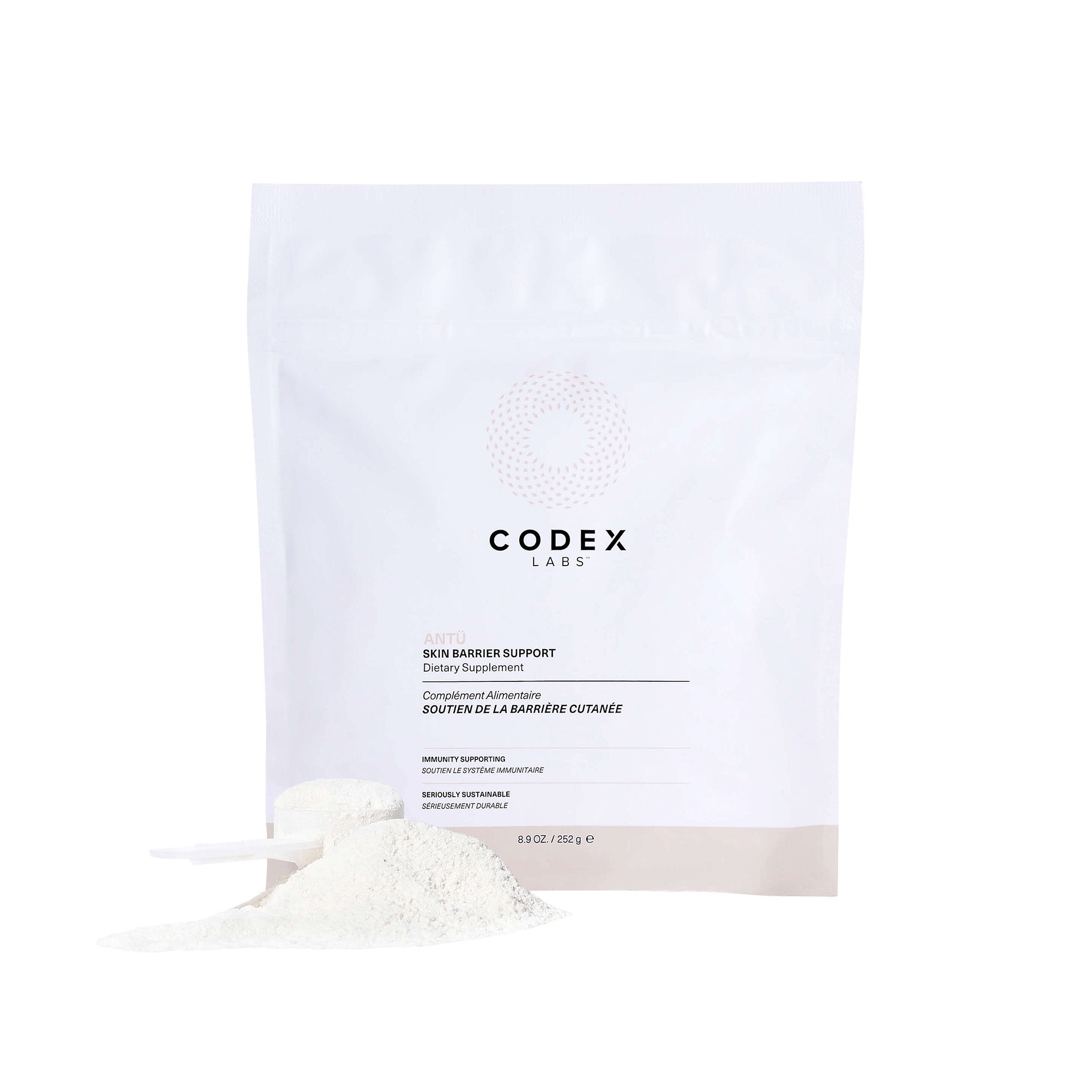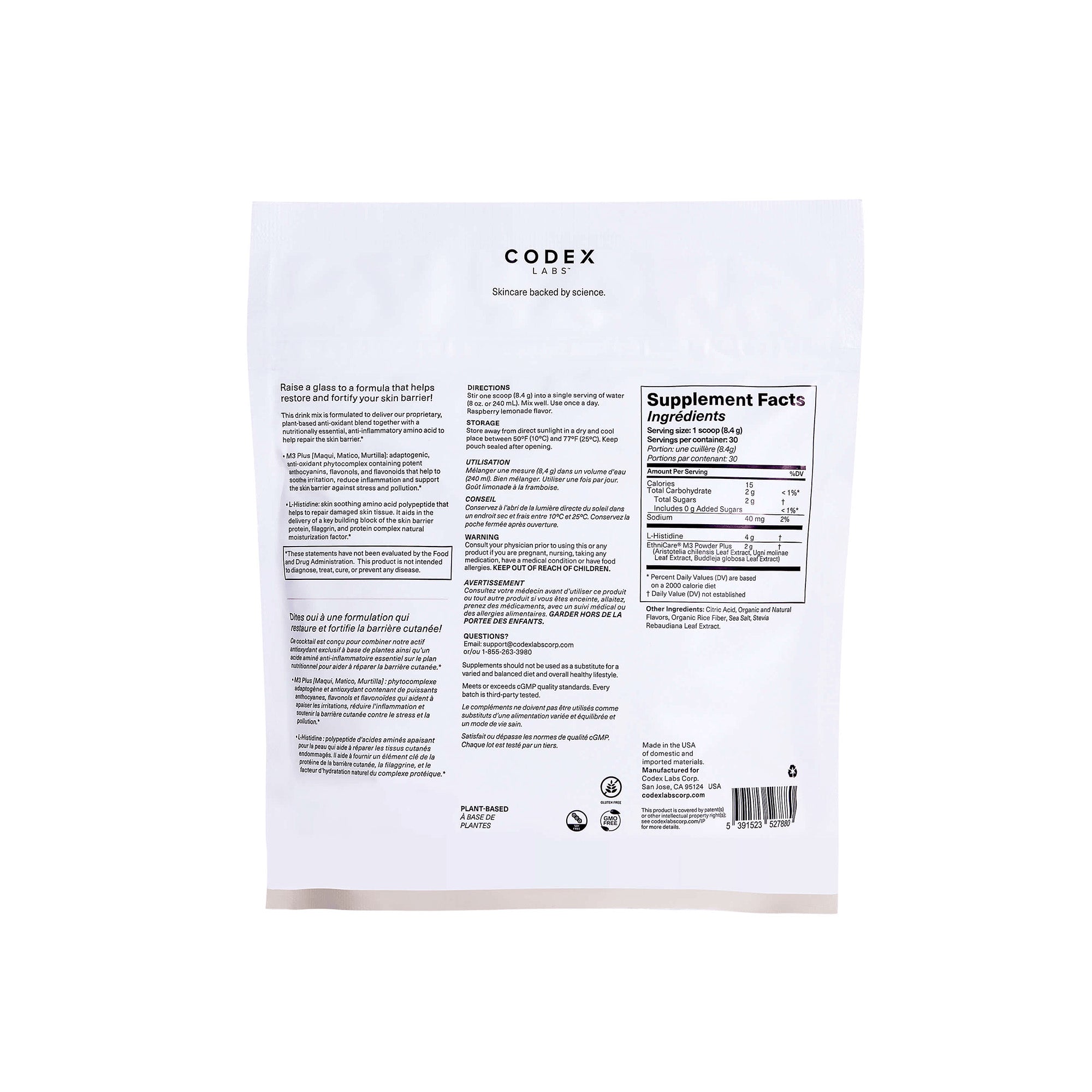Summary:
- Eczema, is a chronic inflammatory skin condition, that affects millions and is characterized by dryness, itching, and inflammation caused by due to a compromised skin barrier and an overactive immune response.
- Antioxidants like vitamin E, niacinamide, and polyphenols help repair the skin barrier, reduce calm inflammation, and combat oxidative stress, thereby alleviating eczema symptoms.
- They function by neutralizing free radicals, reinforcing skin defenses, and promoting healing processes, thereby effectively managing the condition.
- Incorporating antioxidants through topical applications and a dietary supplementation rich in vitamins, omega-3s, and probiotics can meaningfully alleviate eczema-induced symptoms and enhance skin health for eczema sufferers.
Introduction
Eczema is a chronic inflammatory skin condition that affects millions of individuals worldwide, profoundly impacting their quality of life. Symptoms such as persistent dryness, itching, redness, and inflammation can be debilitating, especially in severe cases. The condition’s complexity stems from a combination of genetic, environmental, and immunological factors.
Among the various symptom-based management strategies, antioxidants have been shown to be powerful agents when it comes to mitigating eczema symptoms and promoting overall skin health. In this blog article we will unpack and decipher the science of antioxidants for skin in order to explore how they can provide much needed relief from the symptoms associated with eczema, while at the same time promoting overall skin health.

What Is Eczema? [1]
Eczema, or atopic dermatitis, is a chronic inflammatory skin condition characterized by persistently itchy, dry, red, and inflamed patches of skin. It can affect individuals of all ages but is especially common in children. Unlike other skin conditions, eczema appears to stem from a combination of genetic, environmental, and immunological factors.
Compromised skin barrier function coupled with an overactive immune system are key contributors to the condition. A compromised skin barrier is more likely to allow irritants, allergens, and pathogens to more easily penetrate the skin which, in turn, can trigger an eczema flareup leading to eczema-induced inflammation, and its related symptoms. Having a better understanding of these underlying mechanisms is critically important for creating effective symptom management strategies.
The Impact of Eczema on the Skin
1. Skin Barrier Dysfunction
The skin barrier serves as the body’s outer protective shield and is made of lipids (a.k.a. the body’s natural oil), proteins, and dead skin cells. It plays a vitally important role in retaining moisture within the skin while keeping external irritants (air pollutants, harsh chemicals, etc.) out. Unfortunately, when it comes to individuals suffering from eczema, their skin barrier is typically compromised due to a deficiency in essential lipids, such as ceramides. The resulting trans epidermal water loss (TEWL) causes skin to become dehydrated leading to severe dryness, flaking, redness, inflammation and vulnerability to environmental irritants, allergens, and pathogens.
How Antioxidants Help:
Antioxidants like vitamin E and niacinamide help to repair a damaged skin barrier by protecting lipids from degradation, thus enhancing skin hydration by inhibiting excessive TEWL. They also protect and fortify the skin barrier against environmental aggressors, reducing sensitivity and irritation.
2. Immune Dysregulation
Eczema is characterized by an overactive immune response to an internal (ex. genetic) and/or external (ex. drastic change in temperature) trigger that leads to excessive inflammation. This hyperactive immune state results in elevated levels of inflammatory markers, such as cytokines, which when let loose throughout the body serve to further exacerbate eczema-induced symptoms such as redness, swelling, and discomfort.
How Antioxidants Help:
Green tea catechins, resveratrol, and other polyol-rich antioxidants help to modulate (manage) immune pathways, thereby reducing cytokine production and inflammation. By “calming” the immune system, these types of compounds help to alleviate the symptoms associated with eczema flare-ups and restore skin balance.
3. Oxidative Stress
Free radicals, i.e., unstable molecules generated when skin is exposed to the sun’s ultraviolet (UV) rays, air pollution, blue light from electronic devices, and stress, cause oxidative damage to the cells of the skin barrier. In eczema, this damage is amplified because it negatively impacts the skin’s natural repair processes and intensifies inflammation.
How Antioxidants Help:
Potent antioxidants such as vitamin C, coenzyme Q10, and glutathione neutralize free radicals, thus protecting the cells of the skin barrier from oxidative damage. This action not only enhances skin barrier repair but also reduces the severity of eczema symptoms.
Antioxidants: Mechanisms of Action [2]
Antioxidants operate through multiple biological mechanisms to address the core issues of eczema such as:
Neutralizing Free Radicals:
Antioxidants protect our bodies by neutralizing harmful molecules called free radicals before they cause damage to the skin barrier. Free radicals are unstable because they are missing an electron which causes them to steal one from an adjacent healthy cell. This electron stealing domino effect, if left unchecked, damages the skin barrier resulting in a greater likelihood of an eczema flareup and/or a worsening of an existing flareup. Here’s how antioxidants help:
- Give an Electron: Antioxidants can safely give (donate) an electron to a free radical in order to neutralize it, rendering it stable and harmless.
- Provide a Hydrogen Atom: Some antioxidants give free radicals a tiny part of themselves (a hydrogen atom), which helps to calm the free radical down.
- Stop the Chain Reaction: Free radicals can set off a domino effect of damage. Antioxidants act like a barrier that stops this chain reaction before it spreads.
- Block Metal Triggers: Some metals in our bodies (like iron or copper) can make the damage caused by free radicals worse. Antioxidants can lock these metals down, a process known as chelation, so they can’t cause trouble.
Reinforcing the Skin Barrier:
Antioxidants help to reinforce and replenish the skin barrier by protecting it from oxidative damage caused by free radicals and supporting its natural repair processes. Here's how they work:
- Shield Against Damage: The skin barrier is constantly exposed to harmful elements like UV rays, pollution, and free radicals. Antioxidants neutralize these free radicals, preventing them from breaking down the skin’s protective layer.
- Repair the Skin Barrier: Antioxidants support the skin’s natural healing process by reducing inflammation and boosting collagen production. This helps repair damage to the barrier and strengthens it.
- Moisture Retention: A healthy, properly functioning skin barrier helps keep moisture in. Antioxidants like vitamin E can improve the skin's ability to hold onto moisture, keeping it hydrated and healthy.
Regulating Inflammation:
Antioxidants help regulate inflammation by calming down the body’s response to stress or injury. Here's how:
- Neutralizing Harmful Molecules: When the body is inflamed, it produces free radicals, which can make the problem worse. Antioxidants neutralize these harmful molecules, preventing further damage.
- Reducing Signals for Inflammation: Antioxidants can interfere with the signals that tell the body to stay inflamed, helping to bring the inflammation under control.
- Protecting Cells: By shielding cells from damage, antioxidants allow tissues to heal faster thereby reducing the long-term effects of chronic inflammation.
In short, antioxidants act like firefighters, stopping the "flames" of inflammation and preventing the damage from spreading.
Promoting Cellular Repair:
Antioxidants promote cellular repair by helping the body fix damage caused by harmful molecules called free radicals. They work by:
- Stopping Further Damage: Antioxidants neutralize free radicals to prevent them from harming skin cells, thus giving the skin barrier a chance to heal and repair itself.
- Reducing Stress on Cells: By protecting skin cells from oxidative damage, antioxidants lower the level of "stress" these cells are subjected to so that they can focus on repairing themselves.
- Boosting Repair Signals: Some antioxidants, such as vitamin C, encourage the body to produce molecules and proteins (ex. collagen) that help to rebuild and fortify a damaged skin barrier.
Incorporating Antioxidants in Skincare
Effective management of eczema involves both topical and dietary antioxidant usage. Here’s how they contribute to skin health
Topical Antioxidants
Vitamin C:
A potent antioxidant, vitamin C brightens the skin, reduces inflammation, and promotes collagen production. Its ability to neutralize free radicals renders it a valuable tool in an eczema management toolbox.
Vitamin E:
Known for its moisturizing properties, vitamin E helps to repair the skin barrier while protecting against UV-induced oxidative stress. It is often paired with vitamin C for enhanced efficacy.
Niacinamide (Vitamin B3):
This versatile antioxidant calms inflammation, strengthens the skin barrier, and increases skin hydration making its use ideal for those with sensitive, eczema-prone skin.
Polyphenols:
Found in green tea, berries, and grapes, polyphenols combat free radicals and soothe inflammation, providing relief from redness and irritation.
Resveratrol:
Derived from red wine and certain fruits, resveratrol offers strong anti-inflammatory benefits which help to reduce the frequency and severity of eczema flare-ups.
Oral Antioxidants
Vitamin C-Rich Foods:
Citrus fruits, strawberries, and bell peppers are a few examples of the types of foods that provide systemic benefits to eczema sufferers by boosting immune function and collagen synthesis.
Vitamin E Sources:
Nuts, seeds, and leafy greens nourish the skin from within while combating oxidative damage caused by free radicals.
Omega-3 Fatty Acids:
Found in fish and flaxseeds, omega-3s have been shown to reduce systemic inflammation and support skin barrier integrity.
Zinc:
Legumes, shellfish, and nuts are sources of zinc, a mineral which aids in skin repair while reducing inflammatory responses within the body.
Probiotics:
Fermented foods like yogurt and kefir improve gut health which, in view of the recent studies on the biological connection/communication between the gut and skin (i.e., the gut-skin axis), is closely linked to skin health and a reduction in eczema symptom severity.
Daily Practices for Eczema Management [3]
Skincare Routine
1. Cleanse your skin with gentle, fragrance-free products so as to avoid irritation, a known trigger for eczema flareups.
2. Apply antioxidant-rich moisturizers to neutralize free radicals, lock in hydration, and protect the skin.
3. Use serums containing potent antioxidants to counter oxidative stress and promote healing.
4. Choose sunscreens with antioxidant ingredients to prevent UV-induced oxidative damage caused by free radicals.
Dietary Adjustments
- Incorporate colorful fruits and vegetables for access to a broad spectrum of different types of antioxidants.
- Stay well hydrated to support proper skin function.
- Consult a dermatologist before using dietary supplements like omega-3s, probiotics, or vitamin C to ensure they align with your treatment plan.
Lifestyle Modifications
- Practice stress-reducing techniques such as mindfulness or yoga, as stress exacerbates eczema.
- Avoid exposing your skin to external eczema triggers such as harsh detergents, allergens, and extreme temperatures.
- Maintain optimal indoor humidity levels to help prevent skin your from drying out.
FAQ
Do antioxidants help with eczema?
Yes, antioxidants neutralize free radicals, reduce inflammation, and support skin repair, making them highly beneficial for managing eczema symptoms.
What are the benefits of antioxidants on skin?
Antioxidants protect against oxidative damage, reduce redness and swelling, improve hydration, and enhance overall skin health.
What vitamin am I lacking if I have eczema?
Vitamin D deficiency is often linked to eczema. Adequate levels can help modulate immune responses and reduce inflammation.
What is beneficial in the treatment of eczema disease?
A combination of moisturizing agents, topical and dietary antioxidants, and anti-inflammatory treatments can help to effectively manage eczema-induced symptoms.
What is the best nutrient for eczema?
Omega-3 fatty acids and vitamins D, E, and C are among the best nutrients, as they support the skin barrier, reduce inflammation, and promote healing.
The Codex Labs Solution for Eczema Symptom Relief
Managing eczema requires a multifaceted approach that includes strengthening the skin barrier, reducing inflammation, and maintaining a healthy microbiome. Fortunately for eczema sufferers, Codex Labs has several innovative technologies (tools) within its arsenal of chronic inflammatory skin disorder solutions “toolbox” that specifically address microbiome maintenance, skin barrier strengthening, and the calming of inflammation. These include our patented PreservX® and BiaComplex® technologies, together with our proprietary Patagonian antioxidant powerhouse, M3Complex™. These technologies work together to protect the skin barrier, soothe irritation, and support overall skin health.
- PreservX®: Supports the Microbiome and Helps Reduces Irritation
Traditional preservatives used in skincare products can often exacerbate eczema by disrupting the skin’s microbiome and causing irritation. PreservX® is a next-generation preservative system designed to be microbiome-friendly while still providing effective antimicrobial protection.
o Key Ingredients in PreservX for Eczema Relief include:
- Microbiome-Friendly Preservation: Unlike harsh preservatives such as parabens and phenoxyethanol, PreservX® contains Lactobacillus ferment, i.e., a probiotic comprised of beneficial bacteria that promotes balance within the skin microbiome for improved skin health.
- Coconut Oil Ferment: Rich in medium-chain triglycerides (MCTs), this ingredient helps combat Staphylococcus aureus, a common trigger for eczema flare-ups.
- Hydrating Properties: Contains propanediol, a plant-based humectant that helps to attract water (moisture) to the skin to help reduce dryness.
By reducing microbial imbalances while preventing further irritation, PreservX® plays a crucial role in alleviating eczema symptoms while keeping skincare products safe and effective.
- BiaComplex®: Helps Repair and Restore Skin Health
Eczema is often linked to deficiencies in the skin’s structural proteins and lipids, which are essential for maintaining a strong and resilient skin barrier. BiaComplex® is a powerful botanical blend specifically designed to repair and restore skin health.
o Key Ingredients in BiaComplex® for Eczema Relief include:
- Colloidal Oatmeal (1%): A well-known FDA-approved skin protectant that soothes itchy, irritated skin.
- Calendula Officinalis Extract: Rich in flavonoids and antioxidants, this botanical ingredient helps to calm inflammation while promoting skin healing.
- Haberlea Rhodopensis: Enhances the production of collagen VI and elastin, thereby helping to improve skin elasticity and skin barrier function.
- Symphytum Officinale (Comfrey Extract): Contains allantoin, an active ingredient shown to accelerate wound healing and skin regeneration.
- Padina Pavonica: A brown algae extract that prevents trans epidermal water loss (TEWL) thereby enhancing moisture retention within the skin.
With its combination of skin-soothing, anti-inflammatory, and skin barrier-reinforcing properties, BiaComplex® is an essential component when it comes to managing eczema and preventing future flare-ups. Codex Labs’ soon to be released BIA® ECZEMA RELIEF LOTION is part of an eczema relief regimen that has been clinically shown to bring significant relief from eczema-induced symptoms.
- M3Complex™: Supports the Gut-Skin Connection for Eczema Relief
Recent research has shown a strong connection between gut health and inflammatory skin disorders like eczema. An imbalanced gut microbiome can contribute to systemic inflammation, worsening eczema symptoms. M3Complex™ is a dietary supplement designed to support gut health, reduce inflammation, and improve skin barrier integrity.
o Key Ingredients in M3Complex™ for Eczema Relief include:
- Matico Leaf Extract: Contains flavonoids that promote fibroblast growth, thereby aiding wound healing while reducing inflammation.
- Maqui Berry Extract: A potent antioxidant that helps neutralize free radicals, thereby lowering the incidence of oxidative stress.
- Murta Leaf Extract: Rich in quercetin and catechins, these compounds help to support gut epithelial integrity and reduce gut-related inflammation.
- L-Histidine: An essential amino acid that has been clinically shown to play a critically important role in providing eczema symptom relief by helping to hydrate and repair the skin barrier.
By addressing inflammation from within the body, i.e., inside the gut, our M3Complex™ complements topical treatments, making it a powerful ally for managing eczema-induced symptoms via the body’s gut-skin communication highway. The ANTU® SKIN BARRIER SUPPORT SUPPLEMENT has been scientifically formulated to provide desperately needed relief from eczema-induced symptoms including itch, dryness, and inflammation.
Conclusion
Antioxidants play a pivotal role in managing eczema-induced symptoms by addressing their root causes: oxidative stress, immune dysregulation, and skin barrier dysfunction. By incorporating antioxidants into one’s skincare, diet, and nutritional supplement routines, individuals can significantly reduce symptoms and improve overall skin health. For those seeking relief from eczema, the integration of antioxidant-rich practices into daily routines offers a holistic and effective approach.
Call To Action
If you or someone you know suffers from eczema, seriously meaningful relief is on the way! At Codex Labs, our team of researchers developed an eczema-relief regimen that blew us away in terms of how well it works. The regimen involves the use of three products, namely, BIA® UNSCENTED SOAP, together with the afore-mentioned, patent-pending BIA® ECZEMA RELIEF LOTION, and ANTU® SKIN BARRIER SUPPORT SUPPLEMENT.
The study’s participants used unscented soap to gently cleanse their skin, after which they topically applied the eczema relief lotion, all while taking the skin barrier support supplement. This trifecta of symptom relieving products, when used daily, yielded shockingly efficacious results. How do we know? Because we have the clinical data to prove it!
References:
1. https://nationaleczema.org/eczema/
2. https://www.healthline.com/nutrition/antioxidants-explained
3. https://nationaleczema.org/blog/daily-tips-for-eczema/





